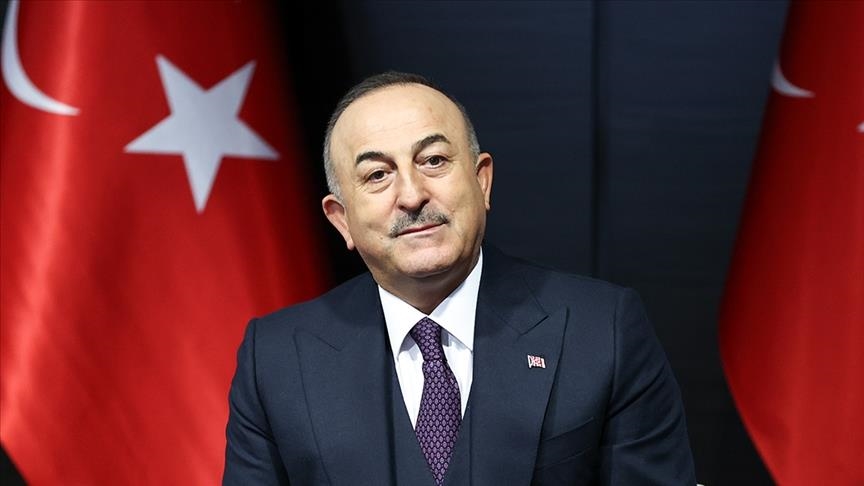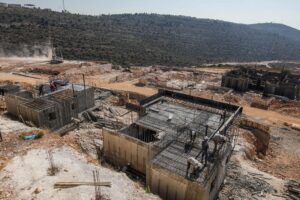Visa liberalization with EU one of Türkiye’s priorities

Ankara, The Gulf Observer: Emphasizing Türkiye’s desire to continue negotiations with the European Union, Turkish Foreign Minister Mevlut Cavusoglu said Thursday that visa liberalization with the bloc continues to be one of Ankara’s priorities.
It is a fact that the Syrian regime has no sovereignty over its territories, PKK/YPG terrorist group continues to dominate, says Mevlut Cavusoglu
In a televised interview, Cavusoglu touched on a variety of topics concerning his country’s foreign policy, saying: “We want to continue negotiations with the EU. But the EU needs to approach this sincerely.”
Noting that Türkiye will “continue to take steps in this direction,” he also reminded that Ankara “suspended the readmission agreement over the EU not fulfilling the visa liberalization (pledge).”
A migration deal was signed on March 18, 2016 as the Syrian civil war continued to uproot millions who then began their “journey of hope” to reach the EU.
The agreement contained six key points: the reinvigoration of Ankara’s EU accession process, modernization of their Customs Union, revival of high-level dialogue, visa liberalization for Turkish nationals, cooperation in managing migration flows, and steps in counter-terrorism.
Türkiye has long complained that while it upheld its end of the deal, the EU did not keep its pledges, including on visa liberalization.
Noting that another priority area for Türkiye’s foreign policy is “economic diplomacy,” Cavusoglu said it includes “health tourism, trade and exports.”
He also listed Ankara’s Africa policy, ties with Latin American countries and Asia Anew Initiative as other priority areas in Türkiye’s foreign policy.
Cavusoglu pledged to increase Türkiye’s role in the EU. He added that developing relations with the US and Latin American countries tops the country’s agenda.
“There is a serious power sharing pursuit in the world. New powers are emerging because of multilateralism and the inadequacy of the system. Türkiye should be in a very solid place in this power sharing,” he said.
Asked about his meeting with Egyptian Foreign Minister Sameh Shoukry in the capital Ankara, Cavusoglu described it as a “very good” one.
“We are now focused on the steps to take with aims to revive relationships. We are making preparations for the meeting of the leaders,” Cavusoglu said, adding a meeting between Türkiye and Egypt’s presidents is expected to be held following Türkiye’s May 14 elections.
The assigning of ambassadors will be announced in a joint statement, said the Turkish minister, as he noted that in their latest meeting they had addressed the establishment of a trade and economy commission as well as a joint chamber of commerce.
“We will support each other during international organizations’ arenas and will support each other’s nominations,” he said.
The Turkish and Egyptian foreign ministers also “agreed on a road map that will lead Libya to elections.”
Diplomatic relations between Türkiye and Egypt have been at the level of charges d’affaires since 2013.
During his March 18th visit to Cairo, the first by a Turkish foreign minister in 11 years, Cavusoglu said the two countries were looking to raise diplomatic relations to the highest level “as soon as possible.”
Asked about the four-way talks between Türkiye, Russia, Iran and Syria, Cavusoglu said the Syrian regime has been insisting on the withdrawal of Turkish security forces from northern Syria since the very beginning.
“But it is a fact that they (Syrian regime) have no sovereignty over their territories and the PKK/YPG terrorist organization continues to dominate the area,” he said.
Reminding that Türkiye’s counterterrorism operations in northern Syria have eliminated the dominance of Daesh/ISIS terrorists, Cavusoglu noted that Türkiye “strongly supports the territorial integrity of Syria…We want to revive the political process. There is no other option.”
On relations with Iraq, the Turkish minister said there is no change in Türkiye’s decision of closing its airspace to flights to and from Iraq’s Sulaymaniyah airport from April 3 to June 3 amid PKK terrorist activities in the region.
“Because there is still a PKK existence there,” he said, adding the control of airspace in Sulaymaniyah is in the hands of the US.
“The US has knowledge of everything, not just in Syria. But we are seeing their engagement with the PKK/PYD across the region. In such case, it is not appropriate for our planes to use that airspace,” he said.
“We will also not allow planes taking off from that airport to enter our airspace,” he said, adding the decision can only be reevaluated if Iraq can “take concrete steps in the fight against the PKK.”
Türkiye’s decision to close off its airspace came as the PKK terrorist organization stepped up its activities in the Sulaymaniyah region, as the Turkish Foreign Ministry previously said the terror group “threatened” flight security.
In its more than 35-year terror campaign against Türkiye, the PKK — listed as a terrorist organization by Türkiye, the US and EU — has been responsible for the deaths of more than 40,000 people, including women, children and infants.
PKK terrorists have hideouts in northern Iraq, across the Turkish border, which they use to plot attacks on Türkiye.( Courtesy:Anadolu )


